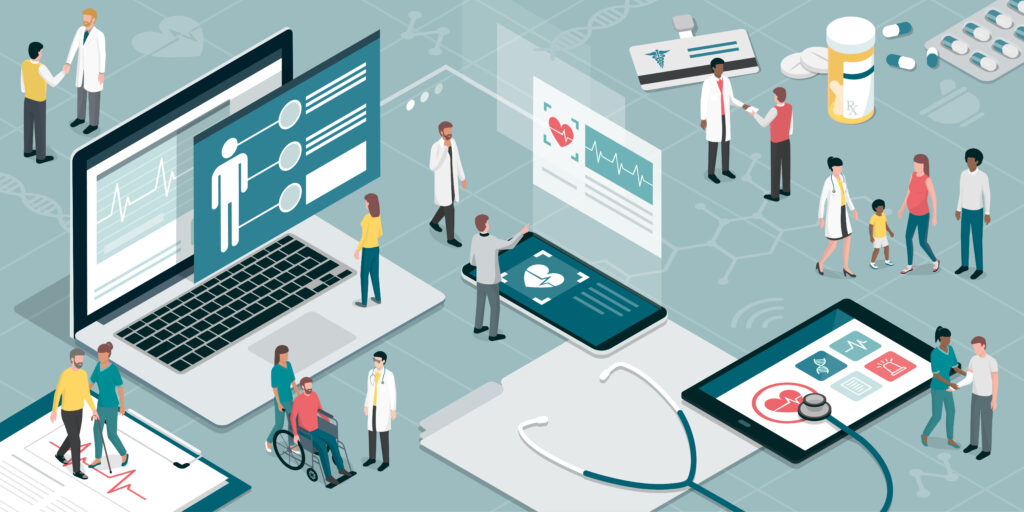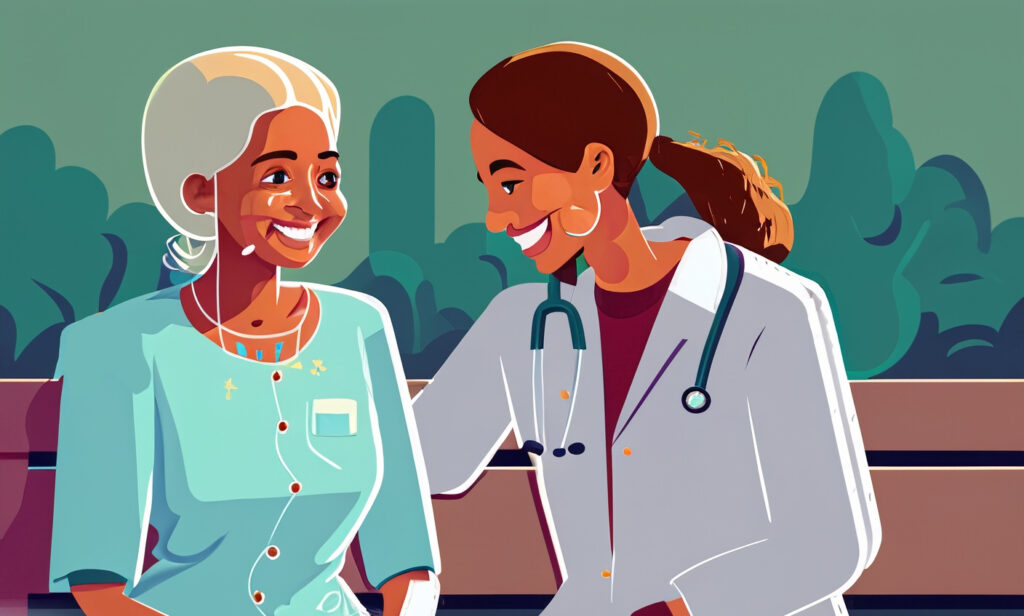
A Healthcare CRM can be a win-win for patients & providers
As with many industries in recent years, healthcare has shifted toward consolidation and centralization, with healthcare organizations serving more patients than ever.
Centralization can yield benefits in areas like standardization and greater efficiency of processes, improved data integration and visibility, and cost savings from realizing economies of scale. However, centralizing services also poses challenges for healthcare organizations that want to provide the personalized, anticipatory care that patients value.
Across many industries, businesses turn to customer relationship management (CRM) systems to help them manage interactions with and personalize service to potential and current customers. Below we outline how healthcare organizations, and their patients can benefit from a CRM system, recommend key aspects to consider when selecting a healthcare CRM system, and highlight two primary healthcare CRM offerings in the marketplace.
——————–
How can healthcare CRM systems help you?

Healthcare CRM systems can enable organizations to more effectively:
- Prospect new patients. The “buyer’s journey” is the process consumers go through to discover, evaluate, and ultimately purchase a new product or service. Early stages of this journey for a patient needing care often involve your website. A CRM system can help convert website traffic into leads that can be nurtured across the stages of that journey. A successful lead generation strategy utilizes a healthcare CRM system to connect your marketing campaigns across channels, including search (both organic and paid), social media, and digital outreach via email or SMS. For example, if a prospective patient searches for information about colon cancer screening, you can use a CRM system to enter them into a journey where they can learn more about the different screening options and conclude by presenting opportunities to schedule an appointment or procedure.
- Personalize experiences to your existing patients. A healthcare CRM system can track patient preferences, analyze demographic and medical record data to suggest next best actions, and help facilitate communication between patients and care providers. An ideal healthcare CRM system will empower frontline staff with the knowledge and tools they need to deliver personalized care, improving the overall patient experience. For example, while a contact center staff member is speaking with a patient who is calling to schedule a physical, the agent can be notified that a patient may be overdue for a breast cancer screening and offer available appointments for a mammogram while they have the patient on the phone.
- Proactively engage with and perform outreach to existing patients. Preventive care is one of the primary areas healthcare organizations can focus on to improve population health. This is a key focus of the U.S. Department of Health and Human Services Healthy People 2030 program, which highlights the importance of increasing preventive care for people of all ages. By incorporating the wealth of data from your electronic health record (EHR) into your healthcare CRM system, you can better define target populations to maximize the impact of outreach campaigns, with a goal of improving health outcomes. A good healthcare CRM will let you reach out to patients across a number of channels, enabling them to seek care on their terms. For example, instead of waiting for patients to come to you to schedule care, you can use a healthcare CRM to easily identify a cohort of high-risk diabetic patients and reach out via text message, email, or other channels and prompt them to schedule a foot or eye exam.
What are the critical features of a healthcare CRM system?
Once you’ve decided that your organization will benefit from a healthcare CRM system, what do you need to look for in a system?
Data Security and Compliance: Prioritize data security and compliance in your CRM system. Healthcare organizations are subject to the standards outlined by the HIPAA Privacy Rule, which regulates the use and disclosure of protected health information (PHI). Look for solutions that adhere to HIPAA guidelines to ensure that patient information remains confidential. Operationally, evaluate user access controls and security measures to prevent unauthorized data access. Validate that systems have robust encryption methods and features like audit trails and change logs to safeguard data integrity and ensure compliance.
Integration and Interoperability: The healthcare CRM system’s effectiveness hinges on its integration and interoperability capabilities. Seek platforms that seamlessly integrate with your EHR and facilitate a comprehensive patient overview. Compatibility with telephony systems improves staff communication efficiency, and integration with marketing automation tools can optimize patient management across channels.
Customization and Configuration: Healthcare CRM systems should offer customization and configuration options to align with specific organizational needs. Prioritize systems that allow creation of custom fields and data entry forms, adapting the CRM to capture pertinent patient information. In addition to the extensibility of the system, you should also carefully consider the ease of customization and maintenance in the context of your IT operations, as users’ needs are likely to evolve over time. Finally, look to assess the extent of user interface customization to ensure the optimal user experience.

Patient Engagement: Effective patient engagement is a crucial component of healthcare CRM systems. Opt for systems offering omnichannel communication capabilities to enable personalized interactions. Look for automation tools that can perform patient outreach and engagement more effectively. Consider features such as lead scoring capabilities and lead source tracking, which can contribute to successful patient relationship management.
Analytics and Reporting: Robust analytics and reporting capabilities provide valuable insights for healthcare organizations. Choose a healthcare CRM system that is equipped with data analytics tools to glean actionable information from patient data and evaluate how easy it is to generate custom reports and access real-time data insights that enable informed decision-making.
Cost and Value: As with any software system, you should perform an assessment of the cost and value of your healthcare CRM system. Evaluate implementation costs, including any required hardware or software investments. It’s important to also consider the ongoing maintenance expenses and licensing costs, balancing those against the features and benefits offered to project your return on investment.
Knowledge Management, Support, and Training: Adequate support and training resources are pivotal for successful CRM adoption. Prioritize vendors that offer comprehensive technical support and training assistance. Consider the resources required for training and any potential integration with learning management systems to ensure a smooth transition for staff.
What are the leading healthcare CRM systems?
Two software companies lead in offering healthcare CRM systems: Epic and Salesforce. While Epic has long been known as a leading EHR provider, it has recently ventured into the CRM market by extending CRM tools to its existing customer base through its module called Cheers. Salesforce, on the other hand, is synonymous with customer relationship management (CRM is even its stock ticker). Salesforce provides an integrated healthcare CRM platform with the use of Salesforce Health Cloud as the core CRM and Marketing Cloud as the marketing automation.
Epic’s Integration Advantage
Epic’s standing as the most widely used EHR provides a distinct edge in terms of integration. Seamless interoperability with EHRs is of utmost importance for healthcare CRM systems, as it allows for comprehensive patient insights to be delivered to care providers and customer service agents. Cheers is designed with this in mind, offering a cohesive experience by connecting patient records with CRM functionalities, such as contact center management and outreach campaigns. This integration streamlines data access, supports personalized patient engagement, and empowers healthcare professionals with a holistic view of the patient story. For organizations already using Epic, adopting their CRM tools by implementing Cheers can lead to a more unified patient management approach.
Salesforce’s Customer-Centric Approach
Salesforce’s reputation as a CRM powerhouse is well-deserved, and its prowess in personalized customer journeys translates well to the healthcare domain. The ability to manage patient interactions, preferences, and engagement across various touchpoints is a key strength of Salesforce’s healthcare CRM. Salesforce’s Marketing Cloud tools integrate with your existing digital marketing channels to deliver a personalized experience to prospective and current patients. This customer-centric approach aligns with the evolving healthcare landscape, where omnichannel patient engagement and satisfaction play a pivotal role in outcomes.
Comparing the Options
Healthcare organizations already using Epic as their EHR might lean toward Cheers, as the familiar user interface and minimizing multiple logins and context switching across multiple systems could improve the experience for staff who handle hundreds of customer interactions every day.
Additionally, the different pricing models employed by Salesforce and Cheers may suit existing Epic customers well. Salesforce has traditionally charged on a ‘per seat’ basis, while the cost of Epic Cheers can be baked into an organization’s existing enterprise contract, making it more cost effective if extending to additional departments across the organization.
Conclusion
Healthcare’s shift towards centralization presents both opportunities and challenges. With this transformation, a healthcare CRM system can be an effective tool in helping healthcare organizations deliver personalized patient outreach and care. These systems help integrate patient data, enable personalized communication, and foster proactive engagement. As healthcare organizations chart their path forward in the changing landscape, effectively utilizing a CRM system can enable care providers to differentiate themselves with the goal of ushering in a new era of patient-centric, anticipatory care.
Curious to explore the potential of an optimized healthcare CRM for your organization? Connect with a Hummingbird advisor today for personalized insights!